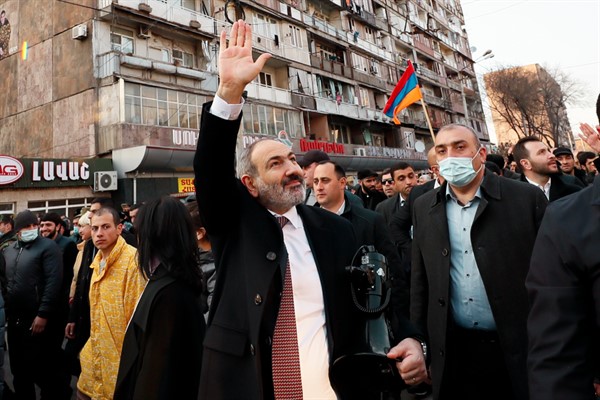After facing months of pressure to resign, Prime Minister Nikol Pashinyan announced on March 18 that Armenia would hold snap parliamentary elections in June. The decision appears to be de-escalating tensions in the country, but it may not end months of political discord in which protesters have regularly taken to the streets calling for Pashinyan’s removal. They’ve been joined by all of Armenia’s former presidents, current President Armen Sarkissian, the powerful leadership of the Armenian church and the bulk of the military’s senior leadership. They all blame him for the country’s decisive loss in last autumn’s war with Azerbaijan, in which Armenia was forced to cede the bulk of Azerbaijani territory it had occupied since the 1990s, including parts of the ethnic Armenian enclave of Nagorno-Karabakh.
Pashinyan appears keen to hold onto power, even accusing some of his opponents of trying to orchestrate a coup. But his hand may have been forced by recent polling conducted for the U.S.-funded International Republican Institute, or IRI, which indicated that 55 percent of respondents support snap elections. Pashinyan, a former journalist who spearheaded the country’s 2018 “Velvet Revolution” that brought him to power, enjoyed sky-high popularity for his first two years in office. But expectations for quick change proved too great, given Armenia’s longstanding problems, including weak state institutions, limited public trust in government and entrenched corruption. Many new officials and parliamentary deputies also hailed from civil society and had limited policymaking experience, all of which complicated their ability to articulate and implement coherent foreign and domestic agendas.
Last year then brought the existential shocks of COVID-19 and the war with Azerbaijan —both of which raised questions about the government’s competence and provided the opposition ammunition to challenge Pashinyan. The problem, however, is that Armenian politics remains highly polarized and viciously personalized, with limited discussion of actual policies. Many of the figures who are taking on Pashinyan now have been in the public eye for decades and have limited popular backing. They have also tried to undermine his standing both at home and abroad, although there is no clear alternative to Pashinyan at the polls so far. This suggests that snap elections may not solve Armenia’s political divisions, no matter who wins.

